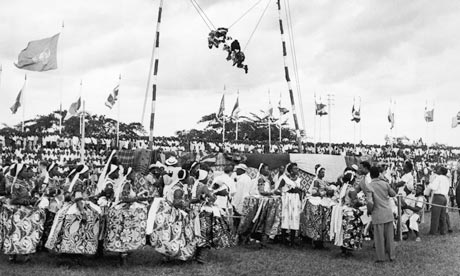
Historian Max Siollun's new book dismantles the military machine that rules Nigeria in exquisite, scholarly detail
At the dawn of independence in 1960, everything seemed possible for Africa's most populous and powerful state. Oil wells promised an endless flow of wealth, fertile land produced enough to feed the nation, and Nigeria single-handedly held half the entire manpower of West Africa.
As with elsewhere across post-independence Africa, the army strongmen who seized power six years later were seen by many as defenders of this vision of prosperity. Thus Nigerians of a certain generation recall the first decade of military rule with rose-tinted nostalgia. These were golden years of press freedom, rivalling that of western countries. In contrast to today's bloated and venal civil service, public workers kept the country running efficiently.
But by the time the civilian government ascended in 1979, they were grappling with the legacy of three disastrous years of civil war and the beginnings of a downward slide into corruption. It was during this era that "government ministry buildings would mysteriously burst into flames just before audits, making it impossible to discover written evidence of corruption," writes historian Max Siollun in Soldiers of Fortune, which charts the history of the middle decade of nearly 30 years of uninterrupted rule by the gun in Nigeria.
After four years of disorderly civilian government, the population gladly welcomed in a military in 1983 that saw itself as "an emergency rescue team that could be called out to depose the civilian government any time the public got fed up with its policies."
Soldiers of Fortune looks at the regime of two men who steered Nigeria for the next decade, setting the country on a path it is still treading today. In lucid prose, Siollun shows how "the military doctor became infected by the ills it came to cure," plunging Nigeria into virtual anarchy.
The book argues that understanding modern Nigeria's apparently default state of being on the brink cannot be understood without going back to this critical junction of military politics. Ethnic politics that plague the civilian population crept into a military swollen more than 20-fold on the back of the Biafra civil war. As it continues to do today, the vast oil wealth pumping in would seduce and corrupt the new strongmen.
By the time General Muhammadu Buhari and General Ibrahim Babangida had between them ruled for a decade, corruption reached levels Siollun calls "spectacular." But it shows the path Nigeria could have followed. One of the defining elements of Buhari's regime was its anti-corruption stance. Indeed the harsh sentences meted out to politicians and drug traffickers cost the regime popular support. But Babangida, who usurped him, unleashed a tide of corruption that continues to swamp Nigeria today, elevating "settlement" – the use of state funds to manipulate and compromise – into state policy.
Military rule eventually reached its nadir with the infamous General Sani Abacha, the diminutive dictator with a Viagara habit, whose death while cavorting with Indian prostitutes in 1998 sparked days of jubilation.
Soldiers of Fortune holds a much-needed mirror to Nigeria's history, and the reflection is not pretty. The press and ordinary folk are accomplices in the country's downward trajectory by "welcoming news of a military coup d'etat and the overthrow of a government they elected with characteristic jubilation."
For those less familiar with the country's past, Siollun's meticulous research provides juicy inside details of pivotal moments. How, for example, did Israeli intelligence officers from Mossad end up sending an agent disguised as a TV producer in an attempt to snare an ex-regime leader exiled in London? Why did ex-military ruler and continental heavy-weight Olusegun Obasanjo refuse to take part in another coup?
While personal memoirs of Nigerian military history abound, a removal from the crises enables Siollun to dismantle the military machine that has ruled Nigeria with more objectivity than these other tomes. Even to seasoned readers familiar with the story, the scholarly attention to detail makes for a refreshing read. It provides a timely insight into the same military rulers still wielding power today, either now wearing civilian garb or from behind the scenes.
Hot off the printing press of the Abuja-based Cassava Republic, Soldiers of Fortune is also testament to a budding and much-needed home-grown publishing market.
Culled from theguardian UK

No comments:
Post a Comment